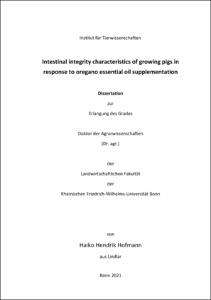Intestinal integrity characteristics of growing pigs in response to oregano essential oil supplementation

Intestinal integrity characteristics of growing pigs in response to oregano essential oil supplementation

| dc.contributor.advisor | Schellander, Karl | |
| dc.contributor.author | Hofmann, Haiko Hendrik | |
| dc.date.accessioned | 2021-09-06T13:02:57Z | |
| dc.date.available | 2022-09-15T22:00:24Z | |
| dc.date.issued | 06.09.2021 | |
| dc.identifier.uri | https://hdl.handle.net/20.500.11811/9293 | |
| dc.description.abstract | The production of protein of animal origin is of great importance worldwide. In Germany, pig production is of considerable importance to meet this need. To ensure successful animal production, an intact intestinal tract with a balanced microflora is necessary. It is assumed that natural herbal substances, such as the oregano essential oil can positively influence the intestinal integrity. In addition to the general animal production improving effects, which have already been well described in the literature, the molecular genetics and microbial justification of such effects has not been conclusively clarified. To improve this knowledge, three studies were carried out as part of this thesis.
For the first experiment, 16 piglets (German Landrace x Piétrain) have been raised and divided into two groups after weaning. One group was additionally given a powdery flavour additive (DOSTO® powder, DOSTO® FARM, Westerstede, Germany) in a concentration of 1500 mg/kg standard diet for 20 days. The powder contains 7.5% pure oregano essential oil, steam distilled from the aromatic plant: Origanum vulgare subsp. hirtum var. Vulkan. At the end of the feeding period, the pigs were sacrificed and RNA was isolated from their small intestines. A comparing qPCR analysis of the two groups revealed a significant reduction in the TNF-α and IL-1β gene expression in the jejunum. Additionally, a significant increase in the marker gene for CD8+ and a reduction in the gene for CD4+ T-cells in the ileum were found. Furthermore, a significant reduction in the mRNA level for E. coli in the small intestines of the oregano group was found. There were no effects in small intestines´ morphology depending on the supplementation. In the second experiment, pigs were reared under identical test conditions as described in the first experiment. 86 pigs were divided into two groups and raised until the end of fattening with an average weight of 111.1±10.9 kg. The pigs were slaughtered in a conventional abattoir and animals´ tissues of the two groups were examined individually. A chip-based transcriptomic analysis revealed, 70 genes were up- and 23 genes downregulated in the jejunum of pigs which have been supplemented with oregano essential oil. In the ileal tissue we found 48 genes to be up- and only 12 genes to be downregulated. The genes, which have been detected in this analysis are generally related to the intestinal immunological response (e.g. cytokines, chemokines) and the intestinal integrity. However, the administration of oregano essential oil exerted just minor effects on pigs´ carcass traits. For the third experiment, microbial DNA was isolated from the intestines of 48 pigs, which have been selected from the second experiment. To investigate the phylogenetic microbial composition, the 16S rRNA gene was sequenced. The α-diversity between the individual intestinal segments (jejunum, ileum, caecum, colon and rectal swabs) was highly different, but no differences between the oregano essential oil supplemented and the control group were found. The β-diversity showed significantly differences between the examined intestinal sections and additionally showed significant differences between the test and the control group in the caecum and in the colon. Among others, the analysis revealed that representatives of the Lactobacillus genus in the colon and the rectal swab samples were significantly increased and representatives of the Prevotella genus in the caecum were reduced by the oregano essential oil supplementation. These three experiments provide an overview of the effect of oregano essential oil on important genes for intestinal integrity and the microflora, which is essential for intestinal health in pigs. | en |
| dc.language.iso | eng | |
| dc.rights | In Copyright | |
| dc.rights.uri | http://rightsstatements.org/vocab/InC/1.0/ | |
| dc.subject | Schwein | |
| dc.subject | Genexpression | |
| dc.subject | Mikrobiom | |
| dc.subject | Oregano | |
| dc.subject.ddc | 570 Biowissenschaften, Biologie | |
| dc.title | Intestinal integrity characteristics of growing pigs in response to oregano essential oil supplementation | |
| dc.type | Dissertation oder Habilitation | |
| dc.publisher.name | Universitäts- und Landesbibliothek Bonn | |
| dc.publisher.location | Bonn | |
| dc.rights.accessRights | openAccess | |
| dc.identifier.urn | https://nbn-resolving.org/urn:nbn:de:hbz:5-63480 | |
| ulbbn.pubtype | Erstveröffentlichung | |
| ulbbnediss.affiliation.name | Rheinische Friedrich-Wilhelms-Universität Bonn | |
| ulbbnediss.affiliation.location | Bonn | |
| ulbbnediss.thesis.level | Dissertation | |
| ulbbnediss.dissID | 6348 | |
| ulbbnediss.date.accepted | 16.07.2021 | |
| ulbbnediss.institute | Landwirtschaftliche Fakultät : Institut für Tierwissenschaften (ITW) | |
| ulbbnediss.fakultaet | Landwirtschaftliche Fakultät | |
| dc.contributor.coReferee | Südekum, Karl-Heinz | |
| ulbbnediss.date.embargoEndDate | 15.09.2022 | |
| ulbbnediss.contributor.gnd | 1246662639 |
Dateien zu dieser Ressource
Das Dokument erscheint in:
-
E-Dissertationen (1116)




